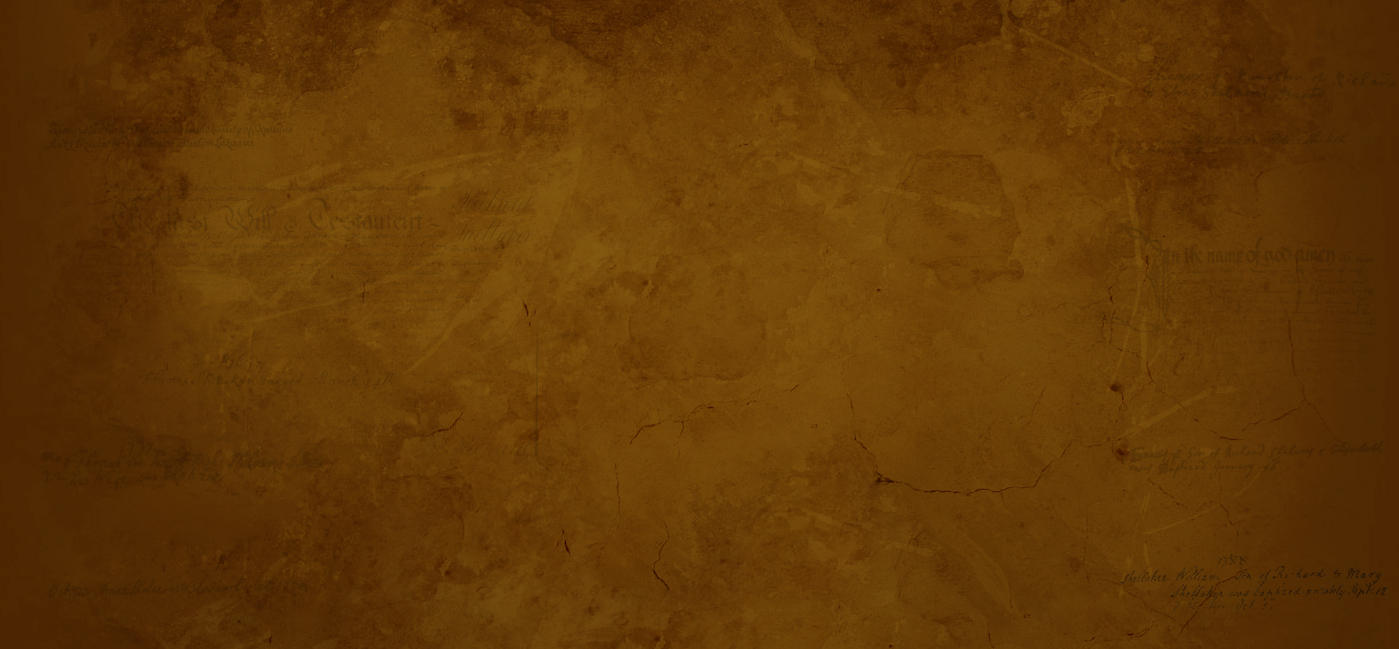

1855 – A TRIAL FOR WILLIAM & SARAH
The year 1855 brought a dramatic episode in the life of William & Sarah, arguably the most unexpected and difficult to understand of all events I have discovered during my research into the history of the Shellaker family.
For in this year William & Sarah Shellaker were charged and face trial for a criminal offence.
The couple are listed in the document below, which is a ‘Calendar of Prisoners’ for the County of Leicester for the Midsummer General Quarter Sessions held on the 2nd of July 1855 at the Castle at Leicester. I have enlarged the section of the Calender of Prisoners, below right, showing the names of William Shellaker and Sarah Shellaker.
The offences, for which they were charged, can be seen on the two documents below on the right. Sarah is charged with two counts of theft; one for the theft of a Counterpane for which she alone is charged and the second charge of the theft of a Napkin, jointly with husband William. (A counterpane was another name for a bedspread or a quilt). Both William and Sarah have the additional related charge of receiving stolen goods. Although these documents are full of legal jargon I have transcribed both documents directly below.
Leicestershire. To Wit [That is to say; namely]
The Jurors for our Lady the Queen upon their Oath presents that Sarah Shellaker on the twenty ninth day of June in the Year of our Lord one thousand eight hundred and fifty-five at Tugby in the County aforesaid
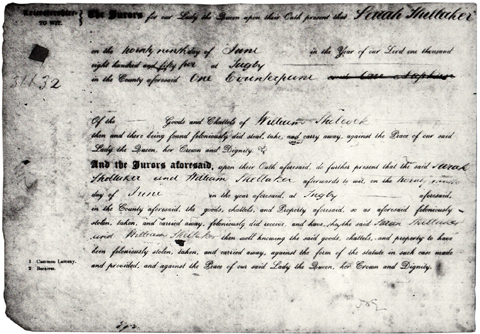 One Counterpane
One Counterpane
Of the Goods and Chattels of William Shilcock then and there being found feloniously did steal, take and carry away, against the Peace of our said Lady the Queen, her Crown and Dignity.
And that the Jurors aforesaid, upon their Oath aforesaid, do further present that the said William Shellaker and Sarah Shellaker afterwards to wit, on the twenty ninth day of June in the year aforesaid, at Tugby aforesaid in the County aforesaid, the goods, chattels and Property aforesaid, so as aforesaid feloniously stolen, taken, and carried away, feloniously did received, and have, that the said William Shellaker and Sarah Shellaker then well knowing the said goods, chattels and property to have feloniously stolen, taken, and carried away, against the form of the statue in such case made and provided, and against the Peace of our said Lady the Queen, her Crown and Dignity.
1. Common Larceny
2. Receiver
Leicestershire To Wit [That is to say; namely]
The Jurors for our Lady the Queen upon their Oath presents that William Shellaker and Sarah Shellaker on the twenty ninth day of June in the Year of our Lord one thousand eight hundred and fifty-five at Tugby in the County aforesaid
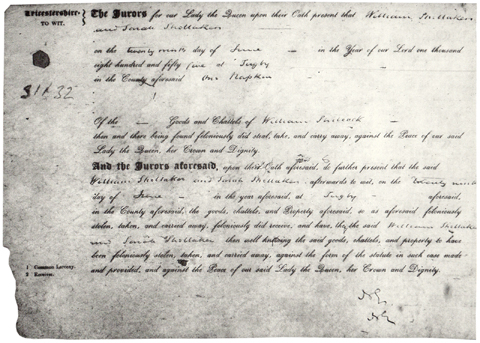 One Napkin
One Napkin
Of the Goods and Chattels of William Shilcock then and there being found feloniously did steal, take and carry away, against the Peace of our said Lady the Queen, her Crown and Dignity.
And that the Jurors aforesaid, upon their Oath aforesaid, do further present that the said William Shellaker and Sarah Shellaker afterwards to wit, on the twenty ninth day of June in the year aforesaid, at Tugby aforesaid in the County aforesaid, the goods, chattels and Property aforesaid, so as aforesaid feloniously stolen, taken, and carried away, feloniously did received, and have, that the said William Shellaker and Sarah Shellaker then well knowing the said goods, chattels and property to have feloniously stolen, taken, and carried away, against the form of the statue in such case made and provided, and against the Peace of our said Lady the Queen, her Crown and Dignity.
1. Common Larceny
2. Receiver
A section of a document showing the outcome of the trial can be seen directly below. It names the accused as William Shellaker and Sarah Shellaker with their respective ages as being 66 and 60 years. William’s Trade is given as ‘Shoe Maker’ – no occupation is recorded for Sarah. In the next column headed ‘Degree of Instrument’ is the word ‘Imp’ is against William’s name and ‘R’ against that of Sarah. This signifies William can ‘Read and write imperfectly’ whilst the ‘R’ indicates Sarah can ‘Read’. [Incidentally the other three categories are ‘N’ – ‘which signifies can neither read nor write’. ‘Well’ – ‘Read and write well’ and ‘Sup’ signifying a ‘Superior education’].
The name and address of the committing magistrate is shown as being The Right Honourable Lord Berners of Keythorpe Hall – which adjoins the village of Tugby. The warrant for the arrest of William & Sarah Shellaker was dated Saturday 30th June 1855 with their trial taking place the following Wednesday, the 4th July which was also the date they were taken into custody. The words ‘On Bail’ appears on the document above William & Sarah’s names, suggesting they were not imprisoned prior to their trail, unlike all the others who appeared in front of the magistrate that day, but were released on bail, possibly due to their age. The offence is recorded as ‘Stealing one Counterpane, value 1s., and one Napkin, value 1s., the property of William Shilcock, at Tugby, in 29th June 1855′.
In regards to the value of the stolen items the ‘s’ is an abbreviation for a Shilling – there were 12 pence to the Shilling and 20 Shillings to a pound. To give some idea of the relative value at that time a carpenter’s daily wage was around 5 Shillings per day in 1850. In the last decades of the nineteenth century William Booth, the Methodist founder of the Salvation Army, estimated that a working family needed an income of at least 18 to 21 Shillings per week, or around £50 a year, just to get by and survive and around 22 to 30 Shillings per week (£57 -£78 per annum) to be considered “comfortable”.
William & Sarah’s trial, was by Jury and before the local magistrate, John Dick Burnaby, Esq. The verdict – William Shellaker was acquitted of larceny (theft) and released. However his wife Sarah Shellaker was found guilty of the charge of larceny (theft) and was sentenced to….
“Imprisonment with hard labour, for 3 calendar months, in the County House of Correction, at Leicester”.
IMPRISONMENT
Details of the trial was reported in the local newspaper, The Leicestershire Mercury, a few days later on Saturday 7th July 1855.
LEICESTERSHIRE MERCURY SATURDAY JULY 7, 1855
NISI PRIUS COURT.
Before J.D.Burnaby, Esq. PETTY JURY. – Messrs. John Weston (foreman), Job Woodcock, John Webb, Black Underwood, James Wright, John Toon,Timothy Summers, Wm.Smith, John Smith, Geo. Pittaway, Robt. Orchard, and Arthur Musson.
WEDNESDAY – Before J.D.Burnaby, Esq.
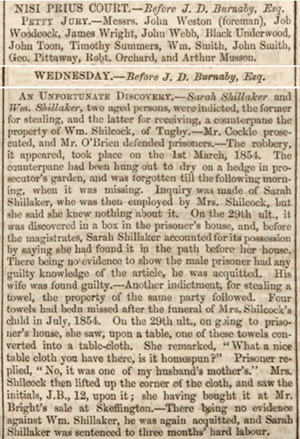 AN UNFORTUNATE DISCOVERY. – Sarah Shillaker and Wm Shillaker, two aged persons, were indicted, the former for stealing, and the latter for receiving, a counterpane the property of Wm. Shilcock, of Tugby. – Mr. Cockle prosecuted, and Mr. O’Brien defended prisoners.
AN UNFORTUNATE DISCOVERY. – Sarah Shillaker and Wm Shillaker, two aged persons, were indicted, the former for stealing, and the latter for receiving, a counterpane the property of Wm. Shilcock, of Tugby. – Mr. Cockle prosecuted, and Mr. O’Brien defended prisoners.
The robbery, it appeared, took place on the 1st March, 1854. The counterpane had been hung out to dry on a hedge in prosecutor’s garden, and it was forgotten till the following morning, when it was missing. Inquiry was made of Sarah Shillaker, who was then employed by Mrs. Shilcock, but said she knew nothing about it. On the 29th ult., it was discovered in a box in the prisoner’s house, and, before the magistrates, Sarah Shillaker accounted for its possession by saying she had found it in the path before her house. There being no evidence to show the male prisoner had any guilty knowledge of the article, he was acquitted. His wife was found guilty.
Another indictment, for stealing a towel, the property of the same party followed. Four towels had been missed after the funeral of Mrs. Shilcock’s child in July, 1854. On the 29th ult., on going to the prisoner’s house, she saw, upon a table, one of these towels converted into a table-cloth. She remarked, “What a nice table-cloth you have there, is it homespun?” Prisoner replied, “No, it was one of my husband’s mother’s.” Mrs. Shilcock then lifted up the corner of the cloth, and saw the initials. J.B., 12, upon it; having bought it at Mr. Bright’s sale at Skeffington.
There being no evidence against Wm. Shellaker, he was again acquitted, and Sarah Shellaker was sentence to three months’ hard labour.
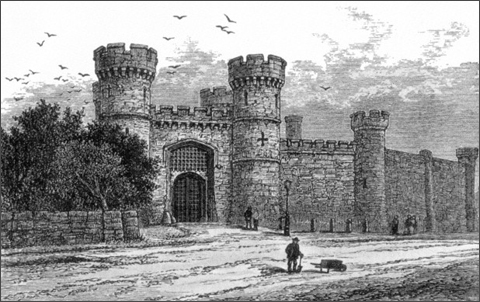 THE COUNTY HOUSE OF CORRECTION, AT LEICESTER
THE COUNTY HOUSE OF CORRECTION, AT LEICESTER
I have established that the Gaol in which female prisoners were imprisoned at that time – “the County House of Correction, at Leicester” – was Welford Road Prison, a building which still stands and remains in use, housing some of the country’s most dangerous criminals.
The prison was designed to resemble a castle, as can be seen from the picture on the right. The oldest parts of which date from 1825, and it was opened in 1828, around three decades prior to Sarah Shellaker‘s incarceration. In 1855 the prisoners held were both male and female, although the prison now holds men only. We do not know the exact conditions Sarah Shellaker endured during those three months as no records from Welford Road Prison remain but there is no reason to believe conditions were any different from those endured by other women in the various gaols in Victorian England, examples of which are below.
Conditions within a Victorian Prison
All physically fit criminal prisoners had to work in their cells for up to ten hours a day. Female prisoners knitted stockings, carried out other sewing work or worked in a Laundry but as Sarah’s sentence was for 3 months ‘hard labour’ it is possible she picked oakum*.
Oakum is a preparation of tarred fibre used in shipbuilding in wooden vessels it was recycled from old ropes, which were painstakingly unravelled and teased apart into fibre into its individual fibres so that they could be used again – hence the saying “money for old rope”. The task of picking and preparation oakum was a common occupation in prisons and also in workhouses. Prisoners were expected to pick between 2 and 5 lbs of oakum each day.
Cell Life
Prisoners slept, ate and worked in their cells, although communal work areas existed in some prison. They were only allowed out for exercise once a day or to wash and use the toilet. On arrival in gaol their details were recorded, they were weighed and measured by the Prison Surgeon and were tested as to their proficiency in reading and writing. They were also given a bath before being issued with a set of prison clothing.
In their cell, they were provided with a hammock or a hard bed, mattress, blankets, sheets, a pillow, towel, comb, spoon and salt cup. Each cell had a stool, box and chamber pot with lid. Often on the wall was hung a copy of the prison rules. Protestant prisoners, such as Sarah, were given a Bible, Prayer Book and Hymn Book.
Food in a Victorian prison
For breakfast a prisoner would receive porridge made with three quarter of a pint of milk and for dinner it was soup and bread. The soup consisted of an ounce of marrow bones or ox head with small amounts of barley, green peas, together with leeks, carrots, onion, turnips and other similar vegetables. Supper, was again porridge with half a pint of milk.
What is known of William Shilcock & his wife – the couple who accused William & Sarah Shellaker of theft?
At the time of this trial William Shilcock, who was originally from Keyham in Leicestershire, was around 31 years old. His wife was named Mary, with a birthplace of Gaulby and was about 36 years old. They lived in the house next door to William & Sarah Shellaker, together with their 3 young children and three servants.
Like William Shellaker, William Shilcock was a farmer although he owed almost twice the acreage as William Shellaker having 135 acres of land upon which he employed four agricultural labourers. He was also a Butcher.
Next Page: Lives at a End